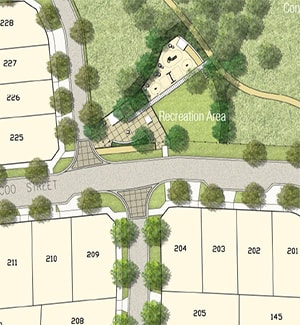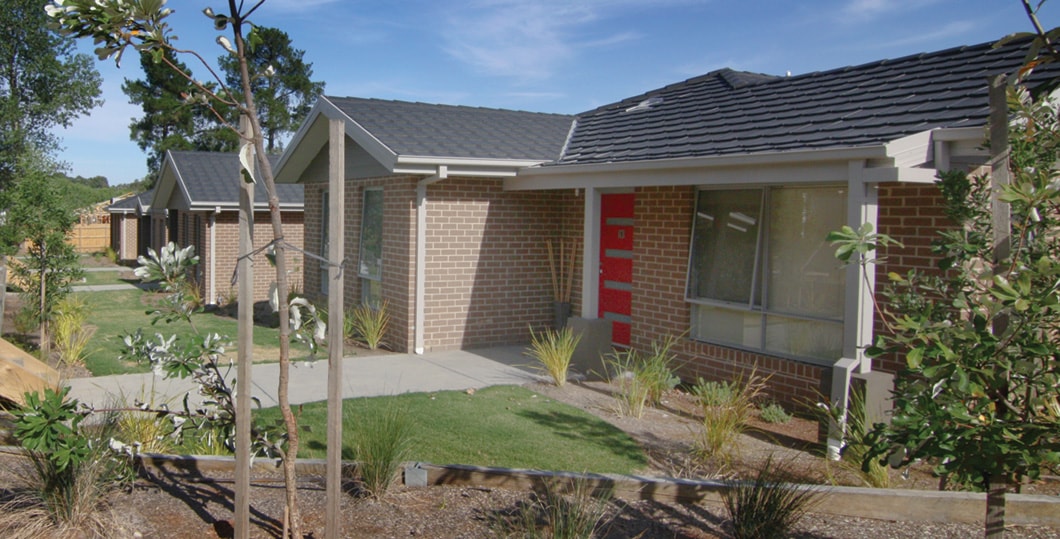WHAT IS AN OWNERS CORPORATION?
Properties that form part of a multi-dwelling or masterplanned residential housing development (eg: units, townhouses, apartments) will fall under an Owners Corporation.
An Owners Corporation (previously known as a Body Corporate) is a body that collectively manages the subdivision of land that is registered at Land Victoria. They are very common entities in the real estate industry, as every property that is part of a subdivided estate (featuring more than one dwelling) typically has a need for a formal Owners Corporation.
The role of an Owners Corporation is to be protective (but not restrictive) over areas of the subdivided land that are regarded as ‘Common Property’. That is, areas or features that are collectively used by and beneficial to, all the individual home (lot) owners. The Owners Corporation system is in place to ensure all of this property is properly maintained, insured and regulated.
WHAT IS MEANT BY COMMON PROPERTY?

While each lot has individual land title and ownership, units/apartments/townhouses form part of a larger parcel of subdivided land and therefore share ‘communal’ aspects of the estate.
Common Property is the property to which title or other evidence of ownership is held by individual members in the common area such as:
- pathways
- shared or central driveways
- nature strips
- common garden areas or parklands
- public lighting
- other facilities such as pools, tennis courts, lifts, entrances, hallways, car parks, stairwells (usually apartment complexes)
WHAT IS AN OWNERS CORPORATION MANAGER?
Instead of individual lot owners personally becoming involved in managing common property affairs, an Owners Corporation Manager (company) is appointed to take care of these matters. This company is paid to manage the Owners Corporation and must have professional indemnity insurance of at least $2 million, and be registered with the Business Licensing Authority. The Owners Corporation Manager has no decision making power or voting rights within an Owners Corporation.
The Manager’s appointment must take place before settlement of any/all properties in the development, in order to achieve the documentation required by the vendor to feature in the finalised Section 32.
WHAT DOES AN OWNERS CORPORATION DO?
The main functions of the Owners Corporation are:
- Repair and maintain the common property, fixtures and services (such as estate entrances, front gardens, public lighting, open spaces driveways and driveway landscaping)
- Maintain appropriate insurance regarding the common property, including compulsory public liability insurance (eg: driveways that will be used by all members of the public, including visitors and trades)
- Organising re-instatement and replacement building insurance (ie: a policy to cover all individual buildings on the land)
- Provide general management and administration of land and buildings contained in the Owners Corporation
- Organise private waste collection in lieu of council services (estate dependant)
- Ensure compliance with all government rules and regulations regarding running an Owners Corporation
- Provide Owners Corporation Certificates to owners or prospective purchasers before/at settlement
WHO MAKES DECISIONS?
The members of the Owners Corporation and/or the Owners Corporation Committee of Management make all Owners Corporation decisions. An Owners Corporation is required to conduct a full Annual General Meeting if it receives or pays out money in any financial year.
WHAT RECORDS DOES AN OWNERS CORPORATION HAVE TO KEEP?
An Owners Corporation management is required by law to keep various records including the full name and address of each member, minutes of meetings, proper books of account and financial statements of all income and expenditure and assets and liabilities.
WHO IS RESPONSIBLE FOR REPAIRS AND MAINTENANCE ON THE LAND?

The Owners Corporation has the legal responsibility to repair the common property and common services (ie: areas that are shared by everyone and do not form part of the individual lot’s boundaries). Each member is responsible to maintain their individual lot to a state of ‘good and serviceable repair’. If a notice to repair is served on an individual lot, that owner must carry out the repairs within 28 days or the Owners Corporation is entitled to carry out the repairs at a cost to the membe
WHO IS RESPONSIBLE FOR INSURANCE ON PROPERTY?
An Owners Corporation must have Public Liability insurance for at least $10 million in connection with the common property and for reinstatement and replacement insurance value for all buildings on the subdivision. This means that new Owners Corporation members (new purchasers) do not need take out individual building insurance for their property, as it is covered by an overall policy for all buildings (often at a very competitive rate saving owners money).
| INSURANCE TYPE | RESPONSIBILITY |
| Common property insurance | = covered by Owners Corporation |
| Building insurance (for each lot) | = covered by Owners Corporation |
| Contents insurance (for each lot) | = individual owner or tenant (if rental) |
| Landlord insurance (if investment property) | = individual landlord |
WHO CAN RESOLVE DISPUTES?
Occasionally there may be disputes amongst owners regarding items on the estate. In these situations, there are options available to resolve disputes:
- Sort it out themselves by approaching the Committee or the Manager of the Owners Corporation
- Lodge a complaint in the prescribed form and seek the complaint to be dealt with in accordance with the dispute resolution process. Speak to your Owners Corporation Manager to access the appropriate documentation
- Obtain legal advice from a specialised legal firm
- Speak to Consumer Affairs Victoria (owners may need to apply to VCAT for an order determining the dispute under Section 165 of the Act)
WHAT FEES ARE CHARGED?
An Owners Corporation sets fees to cover general administration and future maintenance, building and common area insurance and other ongoing Owners Corporation costs. All fees and levies are paid directly to the specific Owners Corporation banking account, usually on a quarterly basis or once per year, and are tax deductible (if an investment property).
The annual fees can vary due to estate size, features and complexity, and can range from approx $900 for small unit developments up to $5,000+ for high-end apartment complexes. On occasion, an Owners Corporation may also levy special fees and/or create a ‘maintenance fund’ to allow for charges to cover future extraordinary items of expenditure (eg: to pay for painting works).
NOTE: The Owners Corporation has no responsibility for individual lot-related utilities such as council rates, water accounts, gas accounts, telephone accounts, pay TV.
SO WHAT ARE THE BENEFITS TO INVESTORS?
Owners Corporations deliver a distinct benefit for investors by essentially being a ‘watchdog’ over their asset, ensuring it has every chance to maximise its growth and maintain property value. They will work in partnership with a professional property manager so that both the internal and external/communal facets of your investment are always maintained at the highest level. This means the investment is a less stressful and time-demanding purchase as oppose to buying a stand-along property (e.g.: house and land), which may not actually deliver any better growth or rental returns.
The benefits to investors include:
- the integrity of your asset is protected as the common/visible areas of the entire development/estate are always kept clean, manicured and safe
- access to highly competitive building insurance pricing (instead of securing and organising your own rate/policy). This saves owners a considerable amount of money. In some cases, the cost savings from being under a collective building insurance policy vs individual building insurance, means that owners receive all the Owners Corporation benefits for no or minimal net cost.
- a neutral, independent and pro-active manager is there to resolve disputes amongst owners
- legally-required insurances (such as building insurance and public liability) on common areas are upkept
- all administration and government reporting is taken care of, saving you time completing paperwork
Owner Corporations should not be viewed as an ‘expense’ but rather a layer of protection and value and an integral part of your overall property investment service.
